- Home
- Anne Frasier
Hush
Hush Read online
HUSH
Theresa Weir writing as Anne Frasier
Smashwords Edition
Copyright Theresa Weir 2002
Originally published by Penguin Putnam
This is a work of fiction. Names, characters, places, and incidents either are the product of the author’s imagination or are used fictitiously, and any resemblance to actual persons, living or dead, business establishments, events, or locales is entirely coincidental.
The scanning, uploading and distribution of this book via the Internet or via any other means without the permission of the publisher is illegal and punishable by law. Please purchase only authorized electronic editions, and do not participate in or encourage electronic piracy of copyrighted materials. Your support of the author’s rights is appreciated.
Praise for Hush
"With Hush, Anne Frasier slams into the fast lane and goes to the head of the pack. This one has Guaranteed Winner written all over it." —Jayne Ann Krentz
"Warning: Don't read this book if you are home alone." —Lisa Gardner
Prologue
He spun the dial on the combination lock—quickly because he'd done it so many times. Clockwise to twenty-six, counterclockwise one revolution, stopping at ten, clockwise to eighteen. He heard the familiar click and pulled down on the lock, watching with an almost sexual excitement as it fell open. He slid the catch through the holes in the handle, then opened the locker, the door rattling with a satisfying metallic resonance.
The locker was where he kept his souvenirs. He'd gotten it at an auction, from the physical education department of a high school that had closed. It was tall, with hooks to hang things, and shelves to put smaller objects.
Using both hands, he reached in and pulled out his scrapbook.
Scrapbook wasn't really a good word for it, because scrap had a negative connotation. For one thing, scrap implied something torn, something leftover, like table scraps, or scrap metal. For another thing, if you took away the s, you'd have crap.
And the book he held with both hands was more than crap, much more. It was his treasure book, his life.
He walked in reverse until the backs of his legs came in contact with the metal springs of his bed, the soft edge of the mattress. He sat down with his treasure book on his lap, his knees together to support the book's weight, his feet on the cement floor of the basement.
It was one of the scrapbooks you could get at any discount store. The kind young girls kept hidden under their beds, bringing them out to share with best friends. His scrapbook was an ivory color that had yellowed around the edges because he'd had it so long. Gold letters spelled out SCRAPBOOK.
It bothered him that it had turned yellow. He wished it hadn't. But he couldn't get a new scrapbook. It wouldn't be the same.
He opened the book.
Glued to the first page was a photograph of a young woman sitting in a hospital bed, a baby in her arms, smiling at the camera. He gently ran a finger across the photo, across the woman's face, giving the bundled infant a little caress before turning the page.
Mementos.
The woman's driver's license. Her tiny book of addresses and phone numbers. Discount-store photos of people he didn't know taken in front of fake Christmas backgrounds. Colors that had once been red were now orange, proving that there was really no such thing as a good deal.
People were stupid.
They smelled, and they were stupid.
The next page was a Polaroid of his first kill, taken in the park where he'd left her. She was already dead when he had her pose for the camera. And since she was a whore, he'd pulled up her dress and pulled down her pants to expose the dark pelt of hair that covered her sexual organs. She had a hand on one hip where he'd placed it, another in her hair in a provocative, slutty pose.
He'd tried to make her smile, tried to pull her lips away from her teeth, but her expression just kept slipping back into a sort of grimace. For his next kill, he brought Scotch tape so the mouth would stay where he wanted it.
Around her neck was the opal necklace he'd given to his mother. She wore it all the time. That made him happy and made his crotch tingle. He pressed the spine of the book against himself.
He continued through the book, reading the yellow clippings he'd cut from newspapers. The Madonna Murderer.
Madonna. Mother and child.
The mothers weren't virgins, they were whores. Whores! He was the untouched virgin. He was the immaculate birth.
The cow upstairs hadn't given birth to him. He couldn't have come from her womb. Not with her stupidity, her TV game shows, her white-trashiness.
He continued turning pages until he came to a photo he'd cut from a newspaper. A photo the paper had gotten from her high school yearbook.
Her hair was long, blond, and straight, her smile wholesome in a cheerleader kind of way.
Hers hadn't been a satisfying kill. She'd robbed him of his pleasure, and in so doing, she'd confused him, sending him into a dark oblivion of pharmaceuticals.
The mental hospital represented a period of time when his mind was foggy and a veil covered his eyes. When his normally quick mind was as thick as motor oil, his thoughts floating away like balloons. But now his head was clear once again.
Looking at her now, he could almost smell her woman's blood, her mother's blood, her birth blood.
He pressed the spine of the book down harder against him, harder, harder, gasping in pain and pleasure.
His mother had caught him masturbating when he was thirteen.
"Dirty boy," he now whispered in a high-pitched voice. "Dirty, dirty boy. Don't ever touch yourself like that, dirty boy. Dirty, dirty boy."
He heard her stumbling footsteps in the room above his head. His face flushed hot with guilt. His hands shook as he closed the scrapbook but continued to hold it over his throbbing penis.
It was ten o'clock in the morning and she was already on her way to being dead drunk. She was almost always drunk. He actually liked her better drunk because when she was sober she saw too much. She would stare at him with her wild eyes, and he would simultaneously wonder why she hated him and what it would feel like to kill her.
Chapter 1
Outside Ivy Dunlap's bedroom window a woodpecker jackhammered away at the wooden shutters of the stone house.
Damn bird. Damn annoying bird.
Her neighbor, Mrs. Gafney, told her if she put a plastic owl on the corner post it would scare the woodpeckers away. But then Mrs. Gafney also sprinkled salt into the sidewalk cracks to kill the weeds, corroding the cement until it turned to dust. She was the same person who ate packages of cookies after midnight while the crumbs gave her bedsores, all because The Enquirer had told her the body burned more calories while a person slept.
Mrs. Gafney lived half a mile away. In winter, Ivy could sometimes see the sun reflecting off the metal roofs of the Gafney house and barn, and on clear nights she could spot the yard light twinkling an uninvasive hello. Sometimes she could even hear Mr. Gafney calling to his milk cows, their bells gently answering as the animals slowly headed for fresh hay and the milking machines. But in summer, when the leaves were on the trees and the air was heavy with dew, Ivy could almost forget the Gafneys existed.
St. Sebastian was a beautiful land of faraway water. Forty miles to the north was Georgian Bay, to the south, Lake Erie. To the west lay Toronto and Lake Huron, to the east, Lake Ontario. Residents of Toronto had summer cottages in St. Sebastian, but few were brave enough to visit in the dead of winter when the wind howled and the roads were closed for days. Not far off, in Bainwood, there were supposed to be men with feet that pointed backward. Ivy had never seen such men, but Mrs. Gafney swore it to be true.
In this part of Ontario, the landscape had been shaped by glaciers that had crawled and
creaked patiently across the earth, rolling the stones smooth. Children spent their summers picking up those ice-age remnants from farmers' fields, piling them high until their nails broke and their fingers bled. It was said that there were no rough stones in St. Sebastian, and of that Ivy was certain.
Outside, the woodpecker continued its morning ritual, moving from one shutter to another, testing them all for bugs.
Ivy lay there listening. Perhaps the tone of her breathing changed, telling Jinx that she was awake, because the tomcat pounced on the bed. He was a polite animal, always waiting until her eyes were open before bothering her, before he tiptoed across the bed to finally he across her stomach, purring while she pet him.
She scratched him under his chin the way he liked it, talking to him all the while, saying things like, "You lazy guy. You just love attention, don't you?"
She hadn't known she was a cat person until Jinx showed up at her door one winter night when the snow was two feet deep and the wind was blowing so hard that the furnace couldn't keep the house warm. He was half-wild, but his hunger had made him temporarily tame. She took him in and fed him, and he let her pet him that first night. But by the next morning, the warm milk and bread had done their work and he had reverted back to the cat he'd been before hunger had taken hold. She tried to catch him to throw him outside—the sun was shining, the wind had stopped—but he was a yellow streak, disappearing under the curio cabinet, where he stayed for three whole days. She tried to coax him out with warm milk, but he wouldn't budge. She offered him a tiny slice of ham, putting it just out of his reach. One stiff, yellow paw appeared from below the antique cabinet, swiped at the ham, and pulled it into the darkness.
"Gotta get up now," Ivy said, gently pushing the cat to the side and flinging back the covers.
In the kitchen, she put milk in his bowl before pouring some over her cereal. After breakfast, she ran three miles on the treadmill, showered, then went outside to the garden. She was gathering strawberries when she heard the far-off ringing of the phone through the open kitchen window.
She got to her feet, moving toward the sound with the bowl of strawberries in one hand. Her sandals, damp with morning dew, took her down the stone path that led from the garden to the kitchen. Inside, the phone was still ringing. She picked up the receiver and answered with a distracted, "Hello?"
On the other end was a voice she hadn't heard in years. A voice she'd begun to wonder if she'd ever hear again. It belonged to Abraham Sinclair of the Chicago Police Department, the man who had helped her disappear.
"It's happening again," was all he said. It was all he had to say.
The ceramic bowl she'd picked up at a flea market slid from her nerveless fingers, crashing to the flagstone, shattering. Strawberries rolled across the floor, finally finding darkness in the cobwebs and dust beneath the antique pie safe.
Breathe, Ivy reminded herself. Breathe.
The moment she'd feared and dreaded and lived for brought her to her knees.
"Claudia? Are you there?"
Claudia. A name from another life.
"Yes," she said, her voice sounding relatively strong considering the way she was kneeling on the floor, quaking. "I—I'm here."
"It's been a long time."
"Yes."
"We need your help, but I'll understand if you want nothing to do with this."
He would be relieved if she said she had put it all behind her, that she'd moved on with her life, that she was now married with two lovely children. From that imagined life, she would be able to tell him about her safe, secure, mundane yet wonderful existence where she carpooled during the school year and made dandelion crowns in summer.
In a way, she had moved on, but not to the extent she would have liked. Because she'd come to find out that no matter how good a person's intentions, it was impossible to forge deep relationships when you harbored secrets that could never be told.
She suddenly saw with an almost spiritual clarity that everything she'd done up to now had been in preparation for this moment. Subconsciously she'd spent the years waiting for a phone call she'd hoped would never come. And all the friends, all the Jinxes and birds and gardens and bowls of strawberries in the world would never be enough. Waiting for this phone call—that's what had driven her.
As the years had passed, she'd begun to believe that her new life was real, her old life over. But now the life she'd worked so hard to build for herself in St. Sebastian faded. In her mind, the friends she'd made and the people she'd met suddenly didn't seem in complete focus.
She would have to make something up, say she was going away for a while, maybe to care for a sick relative. Yes, that should work. The Gafneys could have her strawberries and asparagus, and later, if she was gone that long, her Concord grapes. She was scheduled to teach two summer classes in criminal psychology at the University of Guelph. Those would have to be canceled.
And Jinx. What would she do about Jinx? Mrs. Gafney would be willing to come and feed him, but he'd get so lonely.
She pushed herself to her feet. She straightened. Lately she'd been feeling older than her thirty-nine years. But now, like a soldier preparing for battle, she mentally shook off all things physical. "I'll come."
Chapter 2
Chief Homicide Detective Max Irving took a drink of cold coffee, grimaced, and put the stained cup back down on his desk. He glanced at the clock on the wall, realized he'd missed lunch, then opened up the coroner's report. It was the third time he'd read it in two hours.
Tia Sheppard and infant boy, Timothy Sheppard. The mother's body had ligature marks around the throat, along with twenty-two stab wounds concentrated in the breast and womb—the areas most symbolic of motherhood.
The infant, Timothy Sheppard, died of suffocation. There were no marks of any kind on the body.
Except for the number of stab wounds, the report was almost identical to that of the Madonna Murders of years ago. Max couldn't allow himself to take the obvious path, yet at the same time he had to leave his mind open to all possibilities, no matter how implausible.
The Madonna Murders. It was the name a reporter from the Chicago Herald had come up with, and it had stuck even though it wasn't entirely appropriate— the victims being unwed mothers and their infant sons.
Such tag lines were no longer allowed, but that didn't seem to keep them from showing up.
Sixteen years ago the crimes stopped, and the investigation was eventually turned over to CHESS, Chicago's Central Homicide Evaluation Support Squad, a squad that dealt exclusively with cold cases. That was until last week's murder of a mother and son had people whispering in fear.
His gut feeling was that the murders were the work of a copycat. He felt it was highly unlikely that a serial killer would reemerge again after close to two decades. If the killer had been, say, twenty-four at the time of the original murders, that would make him forty-one now, an age much older than the CPD's profiler had come up with. But then profiles weren't foolproof.
He put in a call to the forensic lab even though he knew they wouldn't have any information yet. It never hurt to remind them of the importance of their report.
"Do you know how backed up we are?" the frazzled lab tech asked.
"Prioritize."
"We are."
"Do I need to mention that this could be a serial killer case?" Max couldn't believe he was lending voice to the very kind of media blitz he'd ranted against.
"Join the club. The serial-killer club."
Black humor. They all did it. It was the only way to get through. But the lab technician's next words were serious.
"We have detectives heading two different Chicago serial-killer investigations. One in Area One, one in Area Three, and now this mother-infant business in Area Five. How do I prioritize that?"
Ten years ago it was speculated that there were fifty serial killers working in the United States at any given time. Now, even though violent crime was down nationwide, serial killings, spree ki
llings, senseless, random acts of cruelty and violence increased on a daily basis. "How much longer?" Max asked, trying to keep his impatience from reflecting in his voice.
"Three, maybe four days."
As soon as Max hung up, the phone rang. It was Superintendent Abraham Sinclair summoning him to his office at Chicago Police Department Headquarters in Area One.
Max pulled his blue Chevrolet Caprice up to the guardhouse window, flashing his ID and badge. The guard nodded. The wooden arm lifted and Max shot through, parking in a lot that was as flat and spread out as a discount store's—the CPD's contribution to urban sprawl.
The soles of Max's black leather shoes rang out against the marble floor as he moved through the revolving doors and passed the wall of stars, a memorial to Chicago police officers killed in the line of duty dating back to 1872. Max checked in with the officer at the desk, then moved down the hall, taking a silent elevator to the fourth floor and Superintendent Sinclair's office.
It was rare for Abraham Sinclair to summon Max to Headquarters. Their meetings sometimes took place over the phone, but more likely over a hasty lunch or dinner.
Preoccupied, Max moved down the hall, mumbling an apology when he brushed shoulders with a female officer. She gave him a smile of reassurance, but he was already past her, his gaze narrowing on the Superintendent's closed door.
Max didn't waste smiles on strangers. He didn't even waste them on coworkers. Occasionally he wasted them on friends, but only occasionally.
Max knocked. Without waiting for an answer, he opened the door and walked in.
Even though the room hadn't been occupied all that long when you consider a policeman's entire career, and even though the flavor of the newly constructed Headquarters was supposed to be that of open airiness, the Superintendent had somehow managed to bring with him the cramped dark feel of his old digs on South State Street. There was a weariness to it, an aura of the taint that eventually became part of the people who dealt with crime and perversion on a daily basis.

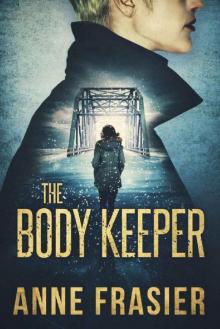 The Body Keeper
The Body Keeper Hush
Hush Play Dead
Play Dead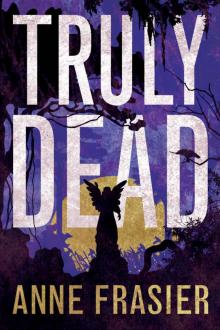 Truly Dead
Truly Dead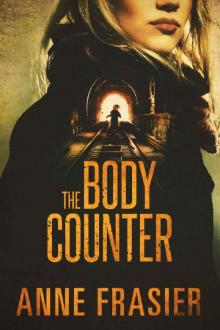 The Body Counter
The Body Counter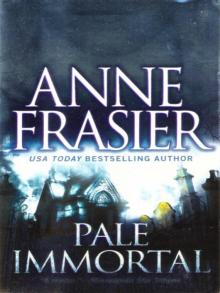 Pale Immortal
Pale Immortal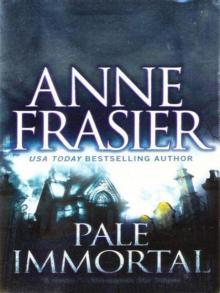 (2006) Pale Immortal
(2006) Pale Immortal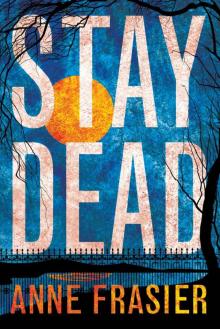 Stay Dead (Elise Sandburg series)
Stay Dead (Elise Sandburg series) Sleep Tight
Sleep Tight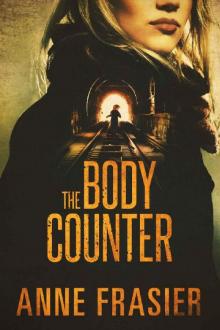 The Body Counter (Detective Jude Fontaine Mysteries Book 2)
The Body Counter (Detective Jude Fontaine Mysteries Book 2)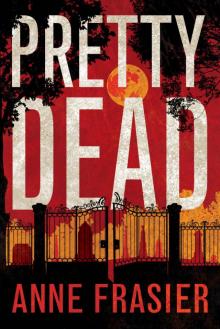 Pretty Dead
Pretty Dead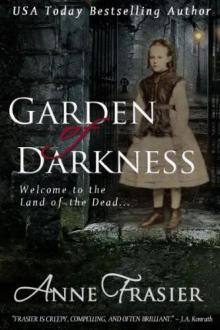 Garden of Darkness
Garden of Darkness